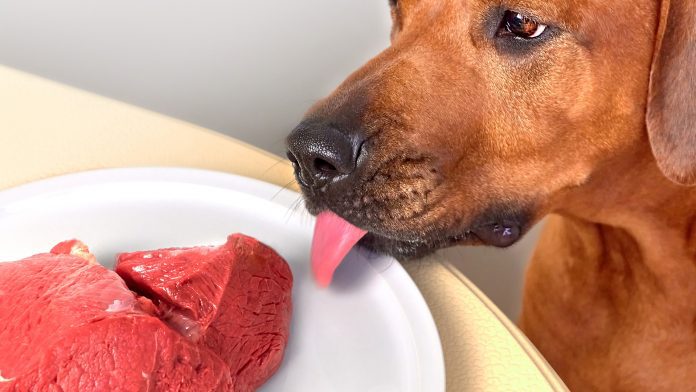
A research team at the University of Bristol has discovered that feeding dogs raw meat may increase the prevalence of antibiotic-resistant bacteria.
Evidence from two studies led by the University of Bristol suggests that feeding pet dogs a diet of raw meat increases the risk of them excreting antibiotic-resistant bacteria, known as Escherichia coli (E. coli), in their faeces. The findings may help develop strategies to combat the global health risk of antimicrobial resistance (AMR).
Analysing dog to human transmission
Earlier studies suggested that bacteria can potentially be transmitted between dogs and humans via everyday interactions. This led the team to theorise that feeding dogs raw meat may be unsafe and that owners should take extra precautions when handling raw meat and cleaning up their pet’s waste.
To investigate this, the researchers performed two studies, recruiting a total of 823 dogs – 223 puppies for the first study and 600 adult dogs in the second study. The owners of the pets completed questionnaires about their dogs’ environment, diet and provided faecal samples from their pets.
The team then analysed the samples for the presence of the antibiotic-resistant bacteria – E. coli – with risk factor analyses performed to identify associations between lifestyle factors, environments reported in the owner survey and the detection of resistant E. coli.
Increased risk of antibiotic-resistant bacteria
The results illuminated that eating raw meat caused dogs to excrete resistant E. coli. Both studies observed these effects, suggesting that dogs may transmit antibiotic-resistant bacteria regardless of their age or the length of time they are fed a raw meat diet.
The study also highlighted that environment plays a crucial factor, as raw feeding was a strong risk factor for dogs living in the countryside, whereas risk factors for dogs in the city were more complex, potentially due to their exposure to more dogs.
Matthew Avison, Professor of Molecular Bacteriology from the School of Cellular and Molecular Medicine, said: “Antibiotic-resistant bacteria are everywhere, but some antibiotics are considered critically important for use in humans. We have shown that dogs fed raw meat are more likely to carry bacteria resistant to these important medicines. This doesn’t mean that the animal, or the owner, will become sick.
“E. coli is a widespread bacterium that is found in the intestines of all humans and animals; however, it is a common cause of many diseases including urinary tract infection and can cause serious illnesses including sepsis if it spreads to other parts of the body.
“We should do everything we can to reduce the circulation of critically important antibiotic-resistant E. coli and other bacteria. Our research adds to the increasing evidence that not feeding raw meat to dogs may help in that objective.”
Kristen Reyher, Professor of Veterinary Epidemiology and Population Health at the Bristol Veterinary School and co-author of both studies, concluded: “We know humans and animals share bacteria with one another, so what we find in your pet may well also be in you. Pet owners should be encouraged to practice good hygiene, and not feeding raw food to their dogs can be part of this. We can all do our part to decrease antibiotic resistance and its terrible effects on both human and animal health.”
























